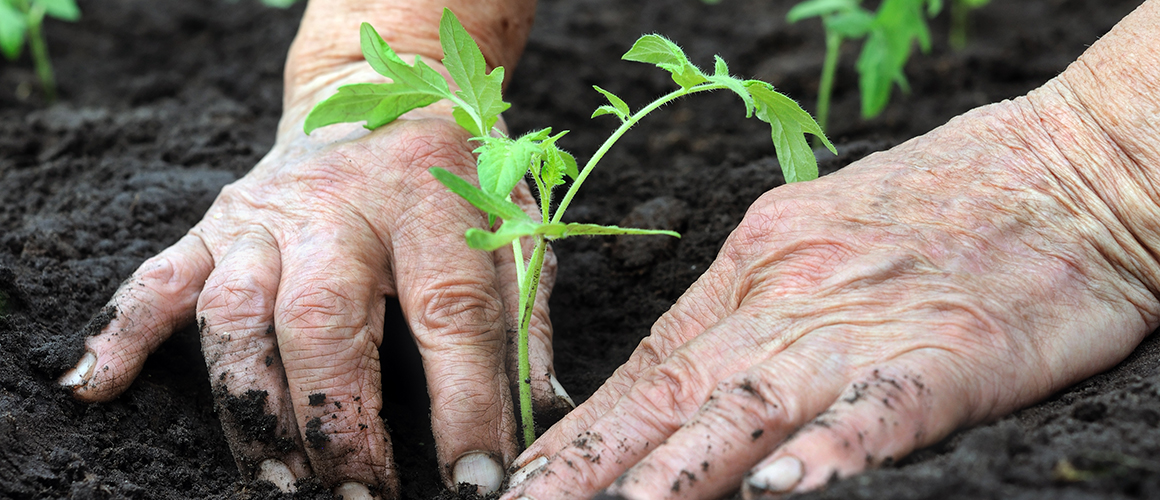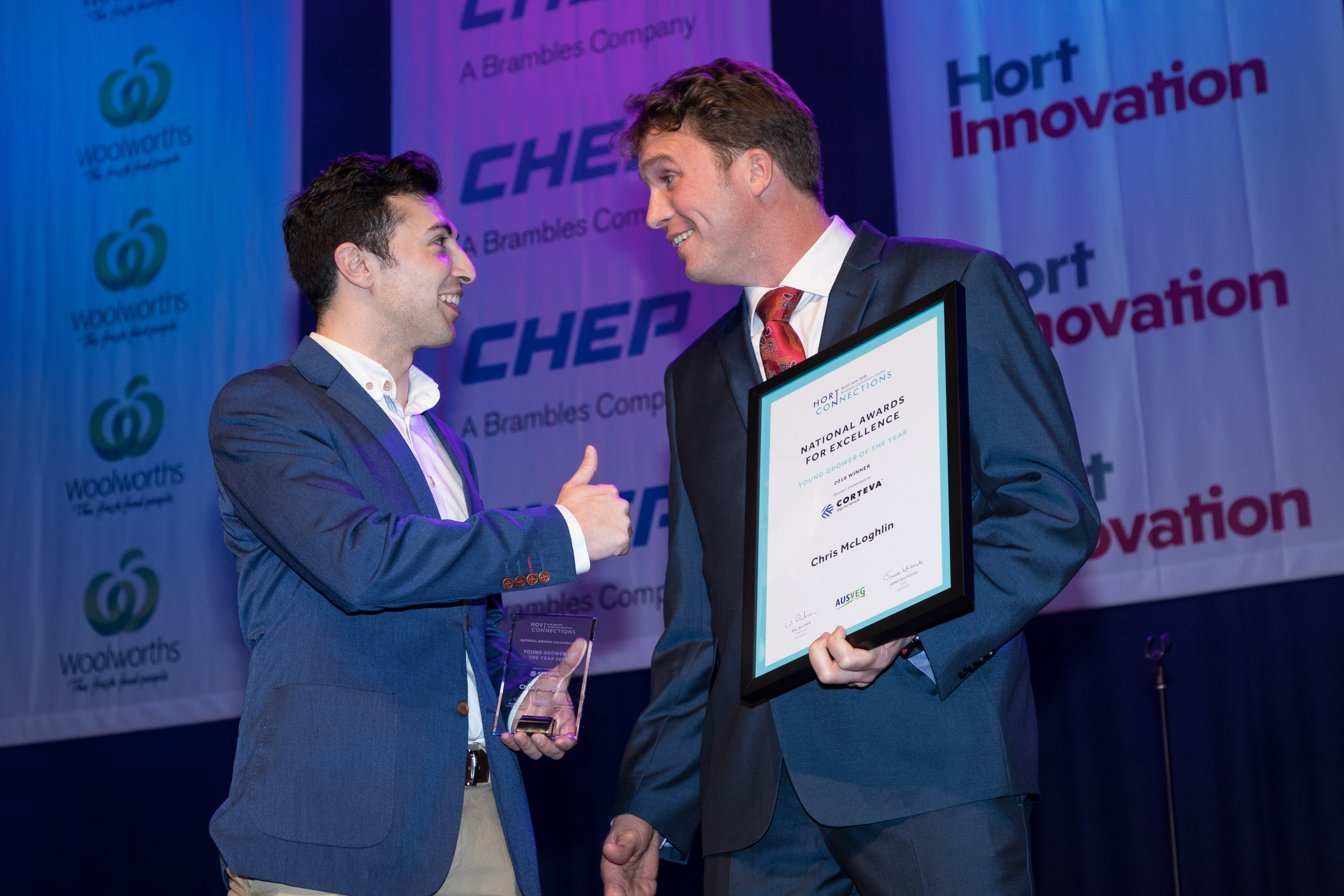
Australian biosecurity officers intercept giant threat from snail smugglers
12 July 2018
Australian veg industry continues to strengthen food safety with new research project
16 July 2018Chris McLoghlin is a passionate organic grower who has built a successful operation that produces well over 600 tonnes of mushrooms annually. Not only has Chris impressed as a grower – the Victorian has also become a strong advocate for the Australian organic industry. The 2018 Young Grower of the Year spoke to Vegetables Australia about his journey.
Fast facts
Name: Chris McLoghlin
Location: Diggers Rest, VIC
Works: Mycelia Organics
Grows: Mushrooms
A Bachelor in Business (with a major in entrepreneurship) is not your typical pathway to a successful career in the horticulture industry.
However, it has proved extremely useful for Victorian organic mushroom grower Chris McLoghlin, who received the Young Grower of the Year Award, sponsored by Corteva AgriScience, at the Hort Connections 2018 National Awards for Excellence Gala Dinner on 20 June.
Chris is Director of Development at Mycelia Organics, which has two mushroom-growing operations in Melbourne’s outer north-west, as well as a compost site.
Mycelia Organics came from humble beginnings. The operation began in early 2015 with around five staff producing approximately 800 kilograms of mushrooms per week. Today, after expanding to a second larger site with its new partners, the business has 55 staff and produces about 12 tonnes of certified organic mushrooms a week.
Choosing an organic path
Chris has been involved with the fresh produce industry for many years, and in his later years at university, the 33-year-old decided to enter the food production sector.
“I was a long way from being able to get into farming, but I sought out some work in the supply chain and started learning about how the markets work,” he explains.
“I ended up working in the markets and started a little veggie cooperative running out of a café that I had at the time, so I started buying and trading some organic produce several years ago. I used that network to learn a bit about where there might be some farming opportunities and how that would eventuate.”
When the chance came up to purchase Mycelia Organics, Chris didn’t hesitate to take the next step towards his passion for organic food production. This decision wasn’t without its initial challenges – the organic farm had shut down, and required re-starting using the same organic production system to achieve certification. Once the organic operation was established – with Chris responsible for managing all aspects of the business – it was time to expand.
“As the business grew, we bought in new partners – this allowed me to work around building the business capacity; implementing new software, new systems, procedures and making sure that a pipeline of clients and markets were developing; and exploring and making sure that we were aware of where they were all going to be on the horizon,” Chris says.
“We were involved in new product development and collaboration of other foods and produce companies to release value-added goods, as well as keeping an eye across the operation.”

Championing advocacy
In addition to building his business, Chris has entrenched himself in the Australian organic advocacy space. He helped to form Organic Industries Australia, the new peak industry body that describes itself as “the voice for Australia’s organic industries in regard to policy and market access”.
“When I joined the industry, there weren’t many avenues for (talking about) some of the technology projects that I was interested in and some of the projects that I thought should be tackled at an industry level. It was a bit disjointed,” Chris says.
“Organics is a pretty broad industry. It covers a set of values which we seek to certify for all different parts of the supply chain, not just horticulture. This was about getting a group of people together and trying to organise whether it was possible to have effective advocacy in those areas that had been neglected.”
In terms of technology, Chris is working alongside other producers on a project tailored to tracking and tracing the quality and characteristics of products more effectively, which in turn will reduce wastage along the supply chain.
Chris is also interested in the export market and what it has to offer the horticulture industry.
“It’s really important to look at some of the phytosanitary requirements for some of those export markets, and technologies around treating our fresh produce so that it can access some of the potentially very lucrative export markets without necessarily having to fumigate, or damage the produce,” he says.
“If we can do that in combination with having a really good quality assurance system in Australia using technology around sensors and shared ledgers, the whole industry has a capability to grow and supply food to Australia and perhaps those lucrative export markets as well.”
Grower challenges
As an organic grower, Chris faces a range of on-farm issues such as the inability to use genetically modified soil-based supplements, which he says results in 15-20 per cent less yield; however, this is managed by maintaining a smaller-sized growing operation.
Off-farm, other challenges include the isolation of the majority of vegetable industry members across Australia.
“Tyranny of distance is a huge challenge for producers everywhere. Our farm is 10 minutes from Melbourne Airport and is reasonably central, so I make sure I go out, travel, meet people and interact with other parts of the supply chain that I think are important for our business,” Chris says.
“That’s why Hort Connections and those kinds of forums are really important. For a lot of people, it’s once or twice a year that they get to interact and find out what everyone else’s doing; what products are available; the trade show element – you hear people talk about what technology they’re working on. My advice is go to those events, and use those sources that are available.”
"One of the best parts about the industry is going to see your product that you have taken so much time to perfect, be sold at the market or in a supermarket. At this point you realise that you have done your job well knowing that someone wants to spend their money on a vegetable you supplied."
This grower profile first appeared in the leading magazine for the Australian vegetable industry, Vegetables Australia. If you’d like to subscribe to receive a new edition of Vegetables Australia in your mailbox every two months, use our online subscription form!

